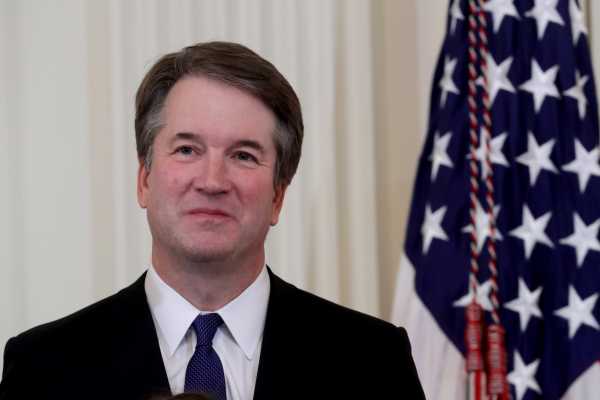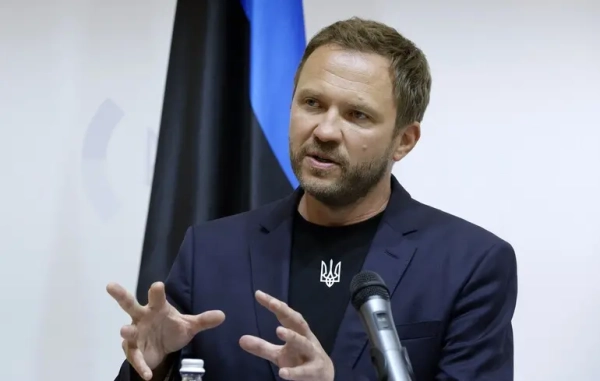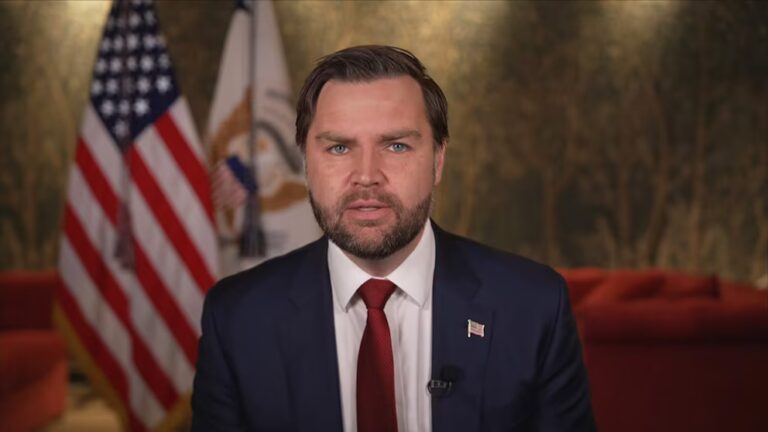
What happens if a sitting president happens to be the subject of a criminal investigation? It’s an issue involving executive power that could rise all the way to the Supreme Court, and one that Brett Kavanaugh, President Donald Trump’s justice pick, could weigh in on if he’s confirmed.
And on that issue (and others), Kavanaugh, a judge on the DC Circuit Court of Appeals, has a paper trail — opinions and other writings that offer insights into how he might make decisions on the highest court. Specifically, a 2009 article for the Minnesota Law Review, in which Kavanaugh wrote that Congress should pass a law to exempt a sitting president from criminal prosecution or investigation.
“I believe that the president should be excused from some of the burdens of ordinary citizenship while serving in office,” Kavanaugh wrote. “We should not burden a sitting president with civil suits, criminal investigations, or criminal prosecutions.”
That might sound nice to Trump: a Supreme Court justice who’s sympathetic to the encumbrance of an ongoing investigation. Of course, Kavanaugh’s article is a bit more nuanced — for one, he suggests Congress should pass a law, which it hasn’t.
But it is not too far-fetched to assume that the Supreme Court may hear some element of the Russia investigation — the subpoena of a sitting president, or (less likely) the indictment of one. And there’s a strong possibility that Kavanaugh could be one of the justices to decide on such matters.
Vox asked seven experts what Kavanaugh’s potential confirmation to the Supreme Court might mean for special counsel Robert Mueller’s investigation. The question is entirely speculative, but Kavanaugh’s past decisions — beyond that Minnesota Law Review article — offer some clues on where he might defer to executive authority.
“There’s no doubt Kavanaugh has a more robust view of executive power than Justice [Anthony] Kennedy,” Jonathan Turley, a law professor at George Washington University, told Vox. “His natural default position is likely to Article II of the Constitution. He has expressed empathy for presidents facing investigations during their term of office.”
The interviews, edited and condensed for clarity, are below.
Mark Tushnet, law professor, Harvard University
I don’t think that we should assume from Kavanaugh’s prior positions about executive power — and the fact that Trump nominated him — that Kavanaugh will necessarily rule in favor of Trump on any issues that get to the Supreme Court. He’s more interested in the power the presidency than the power of this particular president.
Ilya Somin, law professor, George Mason University
Regarding the Minnesota Law Review article, I don’t think we can draw too many conclusions from this article. He does not say it is unconstitutional for the president to either be charged with a crime while he’s still in office, or to be investigated for a civil offense. He doesn’t say that the Supreme Court decided Clinton v. Jones wrongly.
What he said is that Congress should pass a statute to protect the president from these kinds of investigations. That actually implies that the Constitution by itself doesn’t bar them. And of course, Congress hasn’t passed any such statute. They didn’t take his advice, and I don’t think it’s all that likely that Congress is going to pass such a law in the near future.
And it’s notable in that article, Kavanaugh did not say that the statute is not necessary because the Constitution already protects the president. Of course, he could hold that view and decided not to tell anybody about it. I can’t guarantee against that. But in general, the argument that a statute is necessary is some indication he doesn’t assume that the Constitution automatically shields the president against these sorts of investigations.
If I were to point to areas where I had concerns about some of Kavanaugh’s views in executive power, it would be in the area of national security. It also would be the unitary executive. It would not be in this area of the Mueller investigation and whatnot, where all Kavanaugh has really said is that he believes Congress should pass a statue to do this and Congress has not done that.
Franita Tolson, law professor, University of Southern California
I think that he’ll definitely be asked about it during his confirmation hearing. My sense is legal scholars don’t really agree on whether a sitting president can be indicted, so I think people will be interested to see how far Judge Kavanaugh will be willing to go to offer an opinion on that. I suspect not very far. Our confirmation hearings are more performative than anything. They’re not very useful at eliciting information.
But I do think unlike some of the other [Supreme Court] finalists, there’s more of a record here. And his record suggests that he doesn’t think a sitting president can be indicted. Now that doesn’t mean a sitting president, of course, can’t be impeached. There’s some nuance here. He may be of the opinion that — and he made this argument in a law review article that he wrote — that a sitting president should be free of the everyday legal headaches that a normal citizen might endure with respect to being subject to civil or criminal prosecution.
Jonathan Turley, law professor, George Washington University
There’s no doubt Kavanaugh has a more robust view of executive power than Justice [Anthony] Kennedy. His natural default position is likely to Article II of the Constitution. He has expressed empathy for presidents facing investigations during their term of office.
My greater concern is not the Minnesota Law Review article, but his short concurrence to the Klayman case. Klayman was a case where the DC Circuit ruled against a challenge to the metadata collection program of the NSA. Kavanaugh went out of his way to file a concurrence in which he said that even if that collection program was a search under the Constitution, he believed it could be done without a warrant because it fell within an exception — and that exception is that the president had ordered the program to combat terrorism. That is an argument that could have sweeping potential.
Having said that, people are misinterpreting the Minnesota Law Review article. The law review article really talks about Kavanaugh’s preferences; he talks about how he thinks Congress should pass protection. That does not necessarily mean that he believes there are inherent protections in the Constitution from being forced to appear before a grand jury.
I think people overplay the issue. First of all, it’s extremely unlikely that the issue of the indictment of a sitting president will get to the Supreme Court. I happen to believe that a president can be indicted while in office. My view of that is very simple: The Constitution does not say he has an immunity from that type of action.
The problem is the Justice Department has a longstanding policy not to indict sitting presidents. Much has been made of that — quite frankly, the OLC decision from the Clinton period is perfectly dreadful — but all that opinion says is that, ‘frankly we don’t know what the answer is, so we think it’s better not to indict sitting presidents.’
But it really doesn’t matter, because Mueller and [Deputy Attorney General Rod] Rosenstein are likely to continue to follow that policy. The issue that could go before the Supreme Court is the subpoena issue. That one could very well make it to the Court. There isn’t a lot of law in that area, but what exists favors Mueller. If the court rules on the existing precedent, President Trump would be ordered to appear.
There’s no question that Kavanaugh’s highly deferential and empathetic when it comes to presidential power. But subpoena issues are a little different from some of these other questions because it also involves a share of judicial powers. For him to rule with the White House, he would be undermining the authority of the lower courts.
Ciara Torres-Spelliscy, law professor, Stetson University
In our system of separation of powers, the judiciary gives the executive a wide berth to enforce the law. But the Supreme Court and the rest of the federal judiciary will step in if the president or another member of the executive branch appears to be violating the Constitution.
Perhaps the clearest and most relevant example of this is the US v. Nixon case in which President Nixon attempted and failed to quash a subpoena to produce audio tapes made at the White House in an ongoing criminal trial where Nixon was an unindicted co-conspirator with seven defendants who included the former attorney general of the United States and President Nixon’s former chief of staff. The Supreme Court told the president that while he generally has a privilege over his conversations with his advisors, that this privilege had to yield to the rule of law which required President Nixon to turn over the tapes to the Special Prosecutor in a criminal trial.
Judge Kavanaugh has written that he thinks that the president should not be subject to suit or criminal prosecution while in office. This seems to fly in the face of decades of precedent including the Nixon case which states that no one, including the president, is above the law. While we do not know if President Trump has any criminal exposure at this point, this position by Judge Kavanaugh could influence how he ruled on the appropriateness of any future actions by prosecutors against the president.
Of course, as a member of a nine-person Court, he can only make new law on the extent of executive powers (including executive privilege) if four other members of the court agree with him. The Court in Nixon wrote unanimously against President Nixon’s attempts to quash the special prosecutor’s subpoena for the White House tapes. Right now we simply do not know how this story will end. One, we do not know if Judge Kavanaugh will be confirmed and two, as of July 10, 2018, the special counsel has yet to bring any charges against the president — though he has filed charges against President Trump’s former campaign manager, his deputy and his former national security adviser, among others.
William Araiza, law professor, Brooklyn Law School
There are a couple of memos from the Office of Legal Counsel — not from Kavanaugh’s time — there’s one from 1973 and one from 2000 that considered the question whether a sitting president could be indicted. Both of those memos concluded that a president could not be indicted while in office. That’s not really surprising because the OLC would be likely to presume in favor executive power. Nevertheless, I think that is certainly a respectable view. This is not some sort of fringe view about a president’s immunity from being indicted.
I think it would surprise me if Democrats on the [Senate Judiciary] Committee did not question Kavanaugh about that. It’s not at all clear whether Mueller would even try to indict Trump if he thought he had reason. But it’s certainly the case, as [Mueller’s] saying, that he would like to talk to him and maybe subpoena if he won’t talk, and so that’s a really big issue that I think the Democrats on the committee are likely to be thinking about.
More generally, I think one can say — and I don’t have encyclopedic knowledge on what he’s written by a long shot — but it does seem as though, when he was on the DC Circuit he had an affection for presidential power. Let’s put it that way.
There was this case called PHH Corporation. The question was the constitutionality of the Consumer Financial Protection Bureau (CFPB). What Kavanaugh wrote for a three-judge panel was that it was unconstitutional to have this independent agency that was headed by one person. Judge Kavanaugh said that’s a violation of separation of powers. Why? Well, it’s bad enough, he seemed to imply, that there are independent agencies to begin with, but it’s especially problematic when the agency is headed by one person rather than by a group, where different commissioners at the top of the agency pyramid can check each other.
What does that really mean when you step back and take a larger view of this? This kind of agency like the CFPB needs to be more closely under presidential control. And that’s what I mean when I say he has affection for presidential power.
But I think [these are] really interesting governance/separation of powers issues that I hope come up during the hearing. Of course this latter one doesn’t have to do with the Mueller investigation, but to the extent one can find some pattern — and maybe you can’t — but I think there’s something there about Kavanaugh liking presidential authority that would suggest that he also likes presidential immunity, maybe presidential immunity from prosecution and investigation.
Julie Novkov, law professor, State University of New York at Albany
Trump has been fairly clear all along that he was working with judges recommended from within the conservative legal networks of the Federalist Society and the Heritage Foundation, so the choice of Kavanaugh from among the contenders sends an interesting and potentially ominous signal.
We have become accustomed recently to thinking about Supreme Court picks in terms of where they line up on a number of key issues that have split liberals and conservatives: abortion, same-sex marriage, constitutional protections for criminal defendants, the Second Amendment, and the freedom of the states to regulate voting in ways that limit access to the ballot, to name only a few. Kavanaugh puts an additional issue into play — the question of executive authority and the capacity of the other branches to check it.
The evidence we have is not definitive, but it suggests that Kavanaugh would be a reliable vote in favor of expanding executive power, shrinking the capacity of Congress and the courts to serve as a counterweight, and sharply limiting investigations that might tend to disrupt or undermine executive functioning.
Kavanaugh has a history of service within the executive branch, including a stint in George W. Bush’s Office of Legal Counsel and as his staff secretary. The Bush OLC crafted an extraordinarily strong theory of executive power and authority that it used to justify and defend the Bush Administration’s controversial treatment of war detainees. While Kavanaugh did assist independent counsel Kenneth Starr in his investigation of the Clinton White House, he argued in a 2009 article that Congress should enact a law preventing a sitting president from being investigated while in office.
While justices’ prior writings and opinions are not always great predictors of how a justice will rule once elevated to the Supreme Court, it seems plausible that Kavanaugh will provide a reliable fourth vote along with Alito, Thomas, and Gorsuch to support strong executive authority, especially when a conflict entails claims of a security, emergency, or military threat. He also appears to be willing to draw lines to limit the scope of investigations of the president for wrongdoing.
Sourse: vox.com






